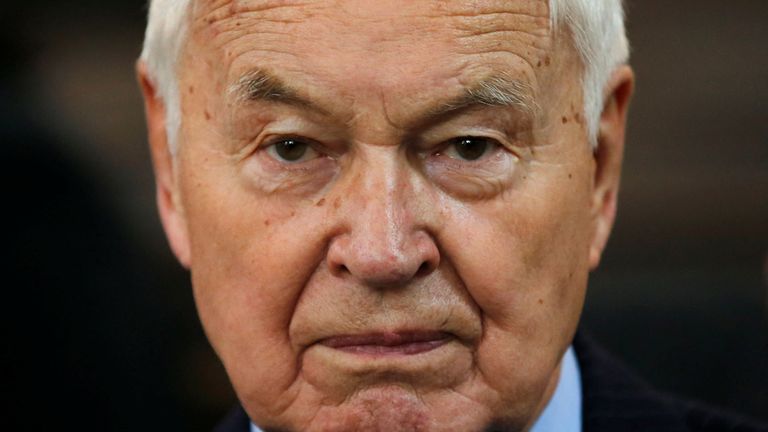Hans Modrow: Last prime minister of East Germany dies aged 95
Mr Modrow became prime minister in November 1989, just four days after the Berlin Wall fell. His turbulent tenure lasted less than six months, during which he oversaw democratic reforms that paved the way for German reunification.
Saturday 11 February 2023 13:25, UK
Hans Modrow, the last communist prime minister of East Germany, has died aged 95.
His death was announced by Germany's hard-left Die Linke party, the successor of the East German Communist Party.
"Hans Modrow left us at the age of 95," it said.
"With this, our party loses an important personality."
"The entire peaceful course of establishing German unity was precisely a special achievement of his. That will remain his political legacy.
Mr Modrow died in the early hours of Saturday morning.
Born in 1928 in the German town of Jasenitz - now Jasienica in Poland - Mr Modrow was a member of the Volkssturm, a Nazi militia that conscripted men aged from 16 to 60 in a last-ditch victory attempt.
At 17, he was captured by Soviet troops and taken as a prisoner of war in the Soviet Union, where he attended anti-fascist classes and became a committed communist.
He joined the ruling Socialist Unity Party (SED) as a young man and rose through the ranks to become regional party boss in Dresden from 1973 to 1989. He also served in the East German parliament for more than three decades.
Mr Modrow became prime minister in November 1989, just four days after the Berlin Wall fell.
His turbulent tenure as prime minister lasted less than six months, during which he oversaw democratic reforms that paved the way for German reunification.
By the time he took the top leadership position, the communists were losing power and momentum so Mr Modrow agreed to share power with an increasingly vocal opposition in favour of reunification.
Despite the communists' initial opposition to reunification, Mr Modrow urged for talks with West Germany toward an eventual "united fatherland" that would be independent of military blocs and governed by a joint parliament in Berlin.
He held East Germany's landmark first free election in March 1990 - less than four months after becoming prime minister - in which his party finished third with 16% of the vote.
The winner was an alliance of conservative parties backed by West German leader Helmut Kohl that backed quick reunification.
East and West Germany eventually reunited in October 1990.
Mr Modrow was a member of the united parliament in Berlin until 1994 and a member of the European parliament from 1999 to 2004.
But his hard-line communist background landed him in court several years after reunification.
He was handed a nine-month suspended sentence and a fine in 1995 after a court convicted him of inciting the falsification of results in Dresden's local elections in May 1989.
Mr Modrow claimed the trial was politically motivated.





